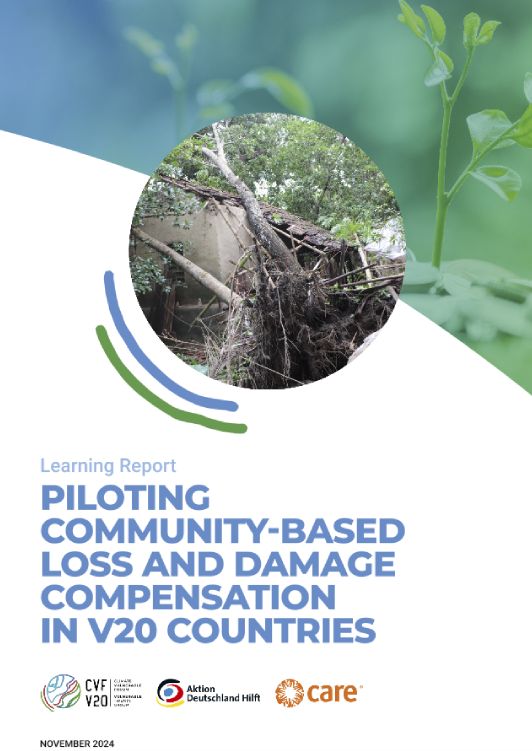Piloting Community-Based Loss and Damage Compensation in V20 Countries
The V20/Climate Vulnerable Forum (CVF) countries, in partnership with CARE Deutschland e.V., launched the project “V20 Pioneering Community Funding for Addressing Climate Change Loss & Damage”. Since mid-2023, loss and damage response actions have been initiated in the pioneer countries of Bangladesh (Sharankhola sub-district), Kenya (Garissa County), and Malawi (Chikwawa). The program was set to run until April 2024 and aimed to invest over $565,000 to deliver concrete loss and damage responses to vulnerable communities while also enhancing their climate resilience for the future. The funding was provided by the Open Society Foundations, administered by Aroha Geneva, an international non-governmental organization and non-profit association, in partnership with CARE Germany, which co-financed the initiative with support from Aktion Deutschland Hilft e.V. (ADH). This funding is additional to government-reported Official Development Assistance (ODA) and adaptation finance.
The project’s activities were classified under the thematic area “Livelihood” and the output taxonomies “Livelihood Assets” and “Adaptation Component”. A locally-led adaptation approach was adopted, aimed at compensating climate-affected communities by providing replacement, repair, and reconstruction of livelihood resources, including tools, implements, private houses, water points, solarization, and rangeland conservation. The project also offered training on climate-adaptive livelihood practices, low-cost disaster-resilient house construction, and water point maintenance.
Through these compensation initiatives, 40,468 individuals (18,664 women, 21,804 men) from 7,000 households were supported. The project specifically targeted communities affected by Cyclone Amphan (2020) in Sharankhola (Bangladesh), Severe flooding (2022) in Garissa (Kenya) caused by El Niño in arid and semi-arid lands, Tropical Cyclone Freddy (2023) in Chikwawa (Malawi).
Given the limited humanitarian assistance through the Loss & Damage (L&D) program, these communities were largely dependent on their own resources for survival.
CARE learned several key lessons from implementing the first-ever Loss and Damage (L&D) compensation project:
- Procedures tailored to the disaster context should ensure compensation is provided promptly.
- Increasing frequency of natural disaster events strains the adaptive capacity of affected populations and raises “residual risk”, necessitating an increase in available L&D funding.
- Collaboration with local partners is essential for accessing areas with high security risks.
- A Cash Plus approach for food allocation and holistic support is effective.
- Each country has specific needs and lessons to be considered.
The project also highlighted the importance of empowerment through skills localization, a coordinated approach involving local authorities and communities in areas of intervention to ensure ownership. Participants who invested their own savings, alongside compensated grants, in rebuilding better using promoted models (livelihood, low-cost disaster-resilient housing, flood protection, etc.) demonstrated greater sustainability and resilience.
CARE recommends the following for future L&D projects:
- Efforts to ‘minimize’ loss and damage should be adaptive, reducing risk and minimizing overall impact. Despite mitigation and adaptation, residual risk remains, increasing the adaptation capacity gap due to the growing frequency of disasters. L&D funds should be increased accordingly.
- Partner with local organizations that have established networks to ensure safe access to high-risk, disaster-affected regions, promoting sustainability while adhering to “Do No Harm” and “Leave No One Behind” principles.
- Allocate specific funds for food, in addition to other support, to allow recipients to use cash transfers for essential expenses.
- Incorporate country-specific recommendations based on the unique contexts and needs of each affected region.

